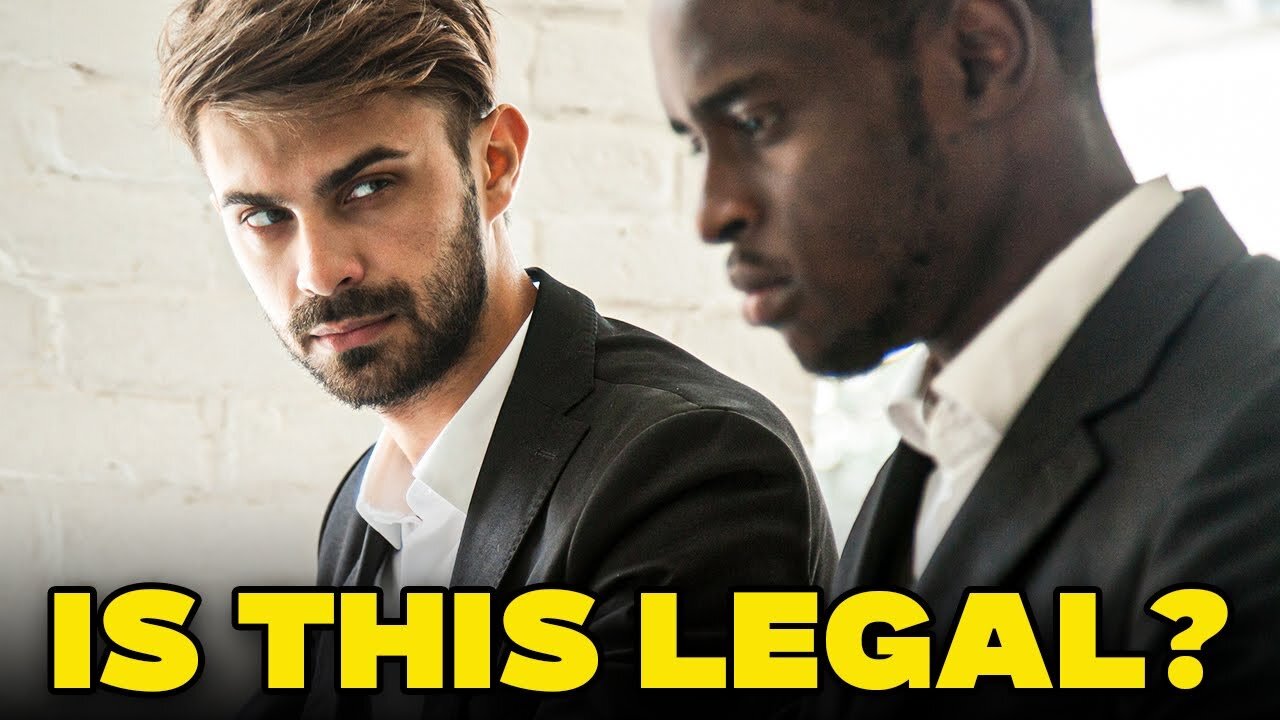Premium Only Content

Is It Legal to Discriminate Against White People?
Hi, I'm Brenton Goodman and this is You Decide a series where I break down hot button issues using facts, law and the Constitution. I won't tell you what to think. I'll just give you the information so that you decide to get a full history of how our discrimination laws were created. Please see my previous video about whether straight people can be discriminated against here when discussing race. The Supreme Court has said laws that discriminate based on race are only legal if they serve a compelling government interest and are necessary and narrowly tailored to achieve that interest. This is the toughest standard to meet, and when the court uses this standard, it is likely that the regulation will be determined to be illegal. This is partially because the courts believe laws based on race are so seldom relevant to the achievement of any legitimate state interest.
That laws grounded in such considerations are deemed to reflect prejudice and hate. However, this is not always the case. The courts realize that there are oftentimes where a law is necessary to correct issues that have come up due to past discrimination. For example, think of specific legal carve outs that we provide to Native Americans. While these laws naturally discriminate and must still overcome the same standards, the courts have found that there is in fact a compelling government interest in acting in this manner, which is protecting Native Americans. So one must really only prove the law is sufficiently necessary and narrowly tailored to achieve that goal. Narrowly tailored just means it is no broader than it has to be. These kinds of laws are normally the ones that are generally discussed as being part of what's called affirmative action. One of the biggest debates around discrimination used to be affirmative action.
For years, universities could consider race as a small factor in admissions because the court recognized a value in having a diverse student body because it recognized many schools discriminated against many sets of minorities. But the Supreme Court has increasingly restricted this saying that race can't be a major factor. It can't be applied by using stereotypes, and there cannot be any quotas in college admissions. The court has indicated that race can be considered only when analyzing the applicant's unique ability to contribute to the university, or when it explains the quality of an applicant's character. Supporters of rules similar to affirmative action say that the Constitution is both colorblind and color conscious. While it makes sure no person is discriminated against by their race, it also is meant to prevent the continuation of racial discrimination and to right the wrongs that still linger from past discrimination. So these rules do the latter and help resolve issues like entrenched poverty and redlining that are legacies of racism still around today. Opponents of these laws
Say that they're just a way to discriminate against people who are members of the majority class, that we no longer suffer from racial issues and prejudice that was so common over 50 years ago, and that we should discourage any law that treats anyone separately based on race, particularly because we have seen the damage that such laws cause to society. So with the laws, it is, does it support discrimination of white people? You decide, let me know what you think in the comments, and don't forget to like and subscribe. I'm Brenton Goodman, and this is, you decide.
-
 1:03:11
1:03:11
Crypto Power Hour
2 hours agoWTH Is Peer To Peer CryptoCurrency Trading?
18.6K6 -
 1:11:31
1:11:31
JULIE GREEN MINISTRIES
3 hours agoLIVE WITH JULIE
71.4K183 -
 35:39
35:39
Producer Michael
17 hours agoROLLS-ROYCE SPECTRE TEST DRIVE GOES WRONG!
44.2K10 -
 15:42
15:42
Nicholas Bowling
16 hours ago $2.73 earnedCharlie’s MURDER Sparks COLLEGE STUDENTS to Boldly Preach the Gospel!
30.2K23 -
 40:10
40:10
Uncommon Sense In Current Times
19 hours ago $2.59 earnedDeconstruction of Christianity | Tim Barnett on Truth, Faith & the Crisis in Today’s Church
36.8K7 -
 LIVE
LIVE
Total Horse Channel
14 hours ago2025 Quarter Horse Congress * Celeste Center * Wednesday October 1st
102 watching -
 4:01:11
4:01:11
The Bubba Army
1 day agoGOVERNMENT SHUTDOWN! - Bubba the Love Sponge® Show | 10/01/25
62.7K6 -
 7:22
7:22
Adam Does Movies
21 hours ago $0.90 earnedThe Smashing Machine - Movie Review
25.4K1 -
 5:15
5:15
Blackstone Griddles
15 hours agoCreamy Cajun Linguine with Bruce Mitchell on the Blackstone Griddle
33.4K1 -
 9:18
9:18
Freedom Frontline
20 hours agoMarco Rubio DESTROYS Stephanopoulos And Exposes USAID Scam
21.7K14